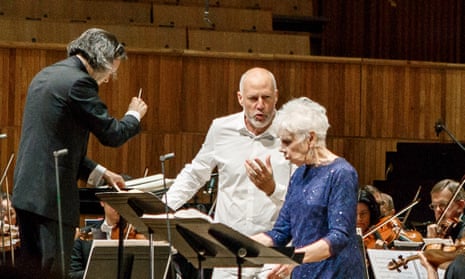The London Philharmonic opened its new season with a concert performance of Oedipe, George Enescu’s only opera, first heard in Paris in 1936. It was greeted with near incomprehension in its composer’s lifetime, and it is only in the past two decades that its qualities and stature have been acknowledged. When the Royal Opera staged it last year, many considered it a lost masterpiece. I missed it on that occasion, and have yet to be fully convinced by it. The LPO’s performance, however, conducted by Vladimir Jurowski and wonderfully well cast, was a superb achievement that made the strongest possible case for the work.
Enescu’s music gets unnervingly under your skin, though it takes time to do so. The opera tells the story of Oedipus from birth to death. Edmond Fleg’s libretto draws on Sophocles’s Theban plays for the last two of its four acts, but is more discursive in its treatment of the preceding material. The stance is anti-Freudian: Oedipus’s blinding is seen as a prelude to spiritual enlightenment rather than as emblematic of the mechanics of repression, and the narrative is presented in religious, broadly theosophical terms. The dramaturgy, however, takes ages to cohere. The ritual element, essential both to classical tragedy and Enescu’s purpose, seems imposed on the action at the start rather than fully integrated. There are longueurs in the first half, and it is not until we reach Oedipus’s encounter with the Sphinx that we fully enter a soundworld at once unique and extraordinary.
Jurowski mined Enescu’s textures for all they were worth. The playing was exemplary as darkening strings and growling brass tracked Oedipe’s descent into psychological and physical darkness, and luminous woodwind marked his eventual emergence into light and spiritual understanding. The Choir of the George Enescu Philharmonic sang the difficult, all-important choruses with tremendous fervour and beauty of tone.
French bass-baritone Paul Gay, meanwhile, performed with great immediacy in the strenuous title role, pushing himself to his expressive limits to convey Oedipe’s arrogance, anguish and eventual nobility. Ruxandra Donose was his sensual yet dignified Jocaste, Christopher Purves the uppity Créon, Willard White the ferocious Tirésias. Graham Clark’s bewildered Shepherd and Felicity Palmer’s troubled Mérope were luxury casting indeed. Ildikó Komlósi, meanwhile, made an outstanding Sphinx, charismatic and sinister by turns, her every phrase fantastically coloured – a truly great artist and utterly mesmerising.

Comments (…)
Sign in or create your Guardian account to join the discussion